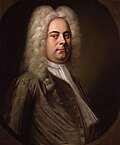Wikipedia:Today's featured article/requests/Handel's lost Hamburg operas
Handel's lost Hamburg operas[edit]
- This is the archived discussion of the TFAR nomination for the article below. Subsequent comments should be made on the appropriate discussion page (such as Wikipedia talk:Today's featured article/requests). Please do not modify this page.
The result was: scheduled for Wikipedia:Today's featured article/August 23, 2016 by — Chris Woodrich (talk) 23:41, 5 August 2016 (UTC)
Of the four operas written by the youthful composer George Frideric Handel (pictured) between 1703 and 1706 when he lived and worked in Hamburg, only the first, Almira, has survived complete. The music for the others is lost apart from a few orchestral fragments. Handel learned the rudiments of opera composition while employed as a violinist at the Oper am Gänsemarkt, Hamburg's famous opera house, and was able to get Almira and a second opera, Nero, performed there during the temporary absence of the theatre's director, Reinhard Keiser. Almira was successful, Nero less so. Handel's last two Hamburg operas, Florindo and Daphne, were not produced at the Gänsemarkt before Handel left Hamburg. No music that can be definitively traced to Nero has been identified, although scholars have speculated that some of it may have been used in later works, particularly Agrippina which has a similar plot and characters. Fragments of music from Florindo and Daphne have been preserved, although without the vocal parts, and some of these elements have been incorporated into an orchestral suite first recorded in 2012. (Full article...)
- Most recent similar article(s): Requiem (Reger) 16 July 2016
- Main editors: Brianboulton
- Promoted: 30 January 2016
- Reasons for nomination: We really do need more noms
- Support as nominator. Brianboulton (talk) 16:14, 30 June 2016 (UTC)
- Support historical tunes Cas Liber (talk · contribs) 11:09, 7 July 2016 (UTC)
- Support. Very interesting, and something most people don't know about. --Coemgenus (talk) 12:19, 7 July 2016 (UTC)
- Support. Interesting topic. Aoba47 (talk) 21:19, 7 July 2016 (UTC)
- Support, matching Monteverdi's --Gerda Arendt (talk) 10:23, 30 July 2016 (UTC)
- I suggest to use an image of a youthful Handel, such as File:Handel quando jovem.jpg, --Gerda Arendt (talk) 10:29, 30 July 2016 (UTC)

